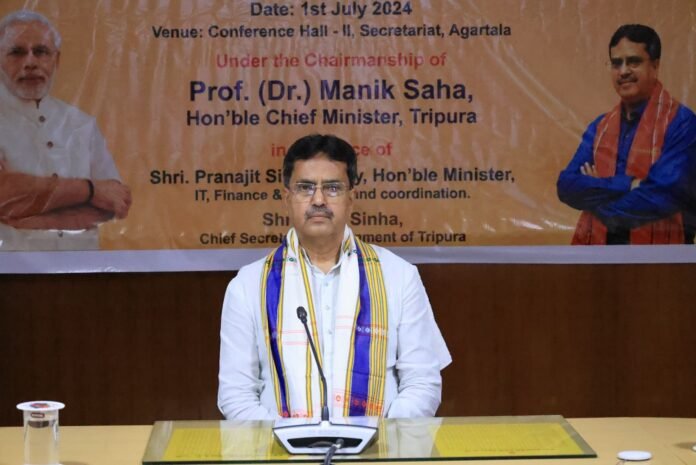Tripura Chief Minister Manik Saha announced on Thursday that the state government has successfully implemented e-office systems across all administrative levels, from the cabinet to the gram panchayats. This move aligns with the state’s broader vision of increasing efficiency and transparency in governance. Speaking at a press conference in Agartala, Saha highlighted the transformative impact of digitization in streamlining administrative processes and bringing governance closer to the people.
According to Saha, the e-office system has revolutionized the way government offices function by reducing the dependency on paper files and manual record-keeping. The initiative is part of the Digital India mission and aims to ensure seamless communication between departments while enhancing accountability and reducing delays in decision-making. The Chief Minister emphasized that adopting such a system reflects Tripura’s commitment to leveraging technology for better governance.
The e-office system has not only been implemented at the state cabinet level but also extended to the grassroots. By enabling gram panchayats to function digitally, the government seeks to empower local governance bodies with modern tools for effective administration. Saha remarked that this step ensures equitable access to resources and enables faster responses to public grievances. “Technology is the bridge that connects the administration with the people, and Tripura is proud to lead by example,” he said.
The Chief Minister shared how the new system has already begun to show results. The speed and efficiency of file movement have improved significantly, allowing officials to focus on delivering better services. He highlighted that the e-office platform provides real-time updates on file statuses, reducing unnecessary bottlenecks. Moreover, the digital record-keeping system ensures greater transparency, as records can now be audited more efficiently, leaving little room for irregularities.
Saha acknowledged the challenges faced in implementing such a wide-scale system, especially in rural areas. Many gram panchayats required infrastructural upgrades, including internet connectivity and computer systems. Training programs were conducted to familiarize local officials with the new system. The Chief Minister expressed gratitude to the teams involved in the transition, noting that their hard work has made Tripura a model for other states in digital governance.
The introduction of e-office systems also reflects the state’s commitment to environmental sustainability. By significantly reducing paper usage, the initiative contributes to conservation efforts and promotes eco-friendly practices within the government. Saha noted that embracing digital solutions aligns with global efforts to combat climate change and positions Tripura as a forward-thinking state.
Critics, however, have pointed out potential pitfalls, including the need for robust cybersecurity measures to protect sensitive government data. Addressing these concerns, Saha assured that the government has prioritized cybersecurity as part of the e-office implementation. “We have partnered with leading technology experts to ensure that our systems are secure and resilient against potential threats,” he stated.
The Chief Minister also highlighted plans to expand the scope of digital governance in Tripura. Future initiatives include integrating e-office systems with other digital platforms, such as those used for public distribution systems, healthcare services, and education. These efforts aim to create a cohesive digital ecosystem that benefits all sections of society.
Tripura’s transition to e-office systems is a significant milestone in its journey toward modernization. By bringing governance into the digital age, the state is setting an example for others to follow. Saha expressed confidence that the initiative will improve public trust in the government and ensure that the administration remains accountable to the people.
Residents of Tripura have welcomed the move, citing the ease of accessing services and the transparency it fosters. With gram panchayats now equipped to handle files digitally, people in rural areas feel more connected to the administration. The Chief Minister concluded by stating that this is just the beginning, and Tripura will continue to explore innovative solutions to improve governance and public service delivery.
As the state moves forward, the e-office system serves as a testament to how technology can transform governance at every level, from urban centers to remote villages. It marks a new era for Tripura, one where efficiency, transparency, and inclusivity define its administrative framework.


